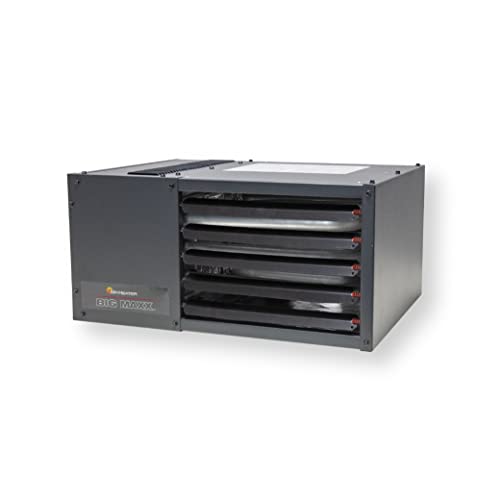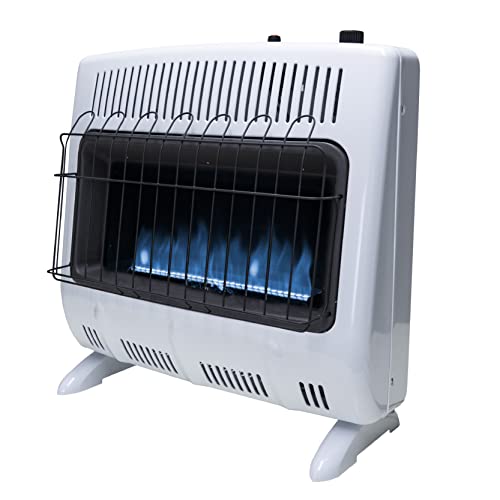Shopping Summary: This guide compares vent-free fireplace inserts, vented unit heaters, blue-flame wall heaters, and dedicated blower kits to help match a gas fireplace heater with an integrated or add-on blower to your space and installation needs.
| Product | Type | Key Feature |
|---|---|---|
| Duluth Forge Ventless 26,000 BTU Insert | Ventless Fireplace Insert | 26,000 BTU, decorative logs |
| Buck Stove ZCBBXL 36″ Fireplace Insert | Vent-Free Insert With Blower | 40,000 BTU, Variable Speed Blower |
| Mr. Heater Big Maxx MHU50NG | Unit Heater (Natural Gas) | 50,000 BTU, powered exhaust venting |
| Mr. Heater MHVFBF30NG Blue Flame Heater | Vent-Free Wall Heater | 30,000 BTU, built-in thermostat |
| FireplaceBlowersOnline GFK-160 Blower Kit | Aftermarket Blower Kit | Dual blower, 180 CFM, thermostat control |
This article reviews each option, focusing on blower capability, heating output, installation considerations, fuel compatibility, and features that affect performance and reliability.
Duluth Forge Ventless 26,000 BTU Fireplace Insert

This ventless gas fireplace insert from Duluth Forge provides 26,000 BTU capacity and is rated to heat up to 1,350 square feet. It uses either liquid propane or natural gas and features hand-painted ceramic logs for a realistic appearance. The unit offers piezo or battery-assisted ignition for user-friendly start-up. As a ventless model, it does not include a blower by default; heat distribution relies on convection and room circulation.
- Heating Range: Up to 1,350 sq ft (26,000 BTU)
- Fuel: LP or Natural Gas
- Aesthetics: Hand-painted, refractory ceramics
- Installation: No chimney or vent required — follow local ventless regulations
Relevant For Buyers Who Want A Decorative Insert Without External Venting. Consider pairing with an aftermarket blower kit or room circulation fans to improve heat distribution in larger spaces.
Buck Stove ZCBBXL 36″ Fireplace Insert With Blower

The Buck Stove ZCBBXL is a vent-free fireplace insert designed for framed cavities and mantel installations. It delivers 40,000 BTU and is engineered for high operational efficiency. This model explicitly includes a variable speed blower for improved heat transfer from the firebox into the room.
- Heating Performance: 40,000 BTU, rated at high efficiency
- Blower: Variable speed blower included for active heat circulation
- Controls: Standing pilot with compatibility for remote or thermostat control
- Sizes: Available in 36″ and 42″ viewing widths
Installation Flexibility Makes This Unit Appropriate For New Construction Or Remodels. The integrated blower and thermostat/remote compatibility aim to deliver more even heat compared with passive vent-free inserts.
Mr. Heater Big Maxx MHU50NG Natural Gas Unit Heater

The Mr. Heater Big Maxx MHU50NG is a natural gas unit heater with 50,000 BTU output intended for garages, workshops, or larger rooms. It features a powered exhaust system enabling vertical or horizontal venting and provides straightforward access to the thermostat and gas connections. As a unit heater, mechanical airflow is used to push heated air into the space.
- Output: 50,000 BTU — suitable for up to approximately 1,250 sq ft depending on insulation
- Venting: Powered exhaust supports flexible vent routing
- Access: External access to controls simplifies maintenance
This model is Relevant When You Need Directed Warm Air With Venting Options. The forced-air characteristic offers quicker room warm-up compared to convection-only ventless units, but requires venting compliance and proper clearances.
Mr. Heater MHVFBF30NGT 30,000 BTU Vent Free Blue Flame Heater

This wall-mounted vent-free blue flame heater produces up to 30,000 BTU and is designed for spaces up to about 1,000 sq ft. It includes a thermostat for temperature control and battery-assisted ignition. The blue flame design promotes convection heating through room air, providing steady, efficient warmth without an integrated blower.
- BTU: Up to 30,000 BTU, effective at altitudes up to 4,500 ft
- Control: Built-in thermostat and included battery for ignition
- Efficiency: Blue flame burners emphasize fuel-efficient convection heat
Best For Homeowners Seeking Wall-Mounted, Vent-Free Heat With Precise Thermostat Control. If improved air circulation is required, consider pairing with a small fan or separate blower accessory to move heat through adjacent rooms.
FireplaceBlowersOnline GFK-160 Fireplace Blower Kit

The FireplaceBlowersOnline GFK-160 is an aftermarket dual blower kit intended to boost heat circulation from compatible fireplaces and inserts. It ships fully assembled and pre-wired and includes a rheostat variable speed controller, automatic thermostat, and power cord. The blower is rated at 180 CFM and uses ball bearing construction for durability and quiet operation.
- Airflow: 180 CFM for increased heat distribution
- Controls: Variable speed rheostat and automatic thermostat
- Construction: Ball-bearing motor, rated to high temperatures
- Installation: Designed for DIY installation with included instructions
This Kit Is Ideal For Owners Of Ventless Or Vented Inserts Who Want Better Heat Transfer Without Replacing The Entire Fireplace. Verify compatibility with your firebox dimensions and electrical accessibility before purchasing.
Buying Guide: Choosing The Right Gas Fireplace Heater With Blower
1. Decide Between Vent-Free And Vented Systems
Vent-Free (Ventless) units do not require a chimney and provide high in-room efficiency, but combustion products remain in the living space; local codes and indoor air quality should guide selection. Vented
2. Blower Type And Performance
Integrated blowers circulate heat actively and often include variable speeds or thermostatic control. Look for CFM (cubic feet per minute) ratings and motor construction (ball-bearing motors are quieter and longer-lasting). Aftermarket blower kits can be an economical way to add forced-air performance to existing fireplaces.
3. BTU Output And Room Size
Match BTU output to the space considering insulation, ceiling height, and climate. As a rough guide, 25,000–40,000 BTU suits many living rooms, while 50,000–80,000 BTU models are geared toward larger garages, workshops, or open floor plans. Oversizing can cause short cycling or discomfort; undersizing will not deliver desired warmth.
4. Fuel Compatibility And Conversion
Confirm whether the unit supports natural gas and/or propane and whether conversion kits are available. Installation should be performed by a qualified technician to ensure correct gas pressure, safe connections, and compliance with regulations.
5. Controls, Thermostats, And Remote Options
Thermostatic control and remote operation improve comfort by regulating heat output automatically. Variable-speed blowers combined with thermostats offer better temperature stability and energy management.
6. Installation Constraints And Clearances
Assess available cavity size, mantel clearance, and venting routes. Vented unit heaters need appropriate venting and clearances; vent-free units have specific minimum clearances and oxygen depletion safety systems in some models. Always check local building codes and manufacturer guidelines.
7. Noise And Motor Durability
Blower noise varies by design and motor type. Ball-bearing motors
8. Safety Features
Look for features such as automatic shutoff, oxygen depletion sensors (ODS), thermal limit switches, and CSA/UL certifications. These improve occupant safety and may be required by local codes for vent-free installations.
9. Compatibility With Existing Fireplace Or Insert
When selecting an aftermarket blower or insert, measure the firebox and check mounting points. Confirm electrical access for powered blowers and ensure controls can be mounted or integrated where desired.
10. Maintenance And Serviceability
Choose models with accessible controls, replaceable parts, and manufacturer support. Regular cleaning of blower blades, filters (if present), and inspection of burners improves longevity and performance.
Comparison Perspectives: Performance, Efficiency, And Installation
Performance: Unit heaters with forced air (Mr. Heater Big Maxx models) produce rapid warm-up and are effective in uninsulated spaces. Vent-free blue flame units and fireplace inserts rely more on convection and may feel gentler but can be less directional.
Efficiency: Vent-free systems claim high in-room efficiency because no heat is lost up a flue. However, ventilation needs and indoor air quality trade-offs should be evaluated.
Installation: Vent-free inserts minimize structural work but may face local restrictions. Vented unit heaters require venting infrastructure and professional installation but often provide better indoor air quality control.
Practical Tips For Maximizing Blower Effectiveness
- Place thermostat or blower intake in a central location where it can detect average room temperature.
- Use variable-speed blowers to reduce noise during lower heat demands and increase circulation during peak heating.
- Complement fireplace blowers with ceiling fans on low reverse to distribute heat across multiple rooms.
- For vent-free systems, periodically ventilate the space to manage humidity and air quality whenever safe and practical.
Regulatory Reminder: Local and state codes vary on the use of vent-free gas appliances. Consult local building regulations and a licensed installer before purchasing or installing any gas heater.